IT Service Management: Ethical Dilemmas in Robotic Surgery Analysis
VerifiedAdded on 2022/09/14
|6
|1427
|15
Report
AI Summary
This report addresses the ethical dilemmas arising in robotic-assisted surgery from the perspective of IT professionals, specifically software developers. It begins with an introduction to the ethical challenges inherent in robotic surgery, where potential patient harm and the need for precise commands create complex decision-making scenarios. The report then delves into ethical theories, including utilitarianism, deontology, social contract theory, and character-based ethics, to provide a framework for understanding these dilemmas. The core of the report focuses on the responsibilities of software developers in ensuring the accuracy and safety of robotic systems, emphasizing the need for clear communication between developers and doctors, rigorous adherence to best practices, and a deep understanding of ethical concepts. The report concludes by offering recommendations for navigating these ethical challenges and highlights the shared responsibility of IT professionals and surgeons in maintaining patient safety and promoting ethical AI practices in surgery.

IT service management
Paraphrase This Document
Need a fresh take? Get an instant paraphrase of this document with our AI Paraphraser
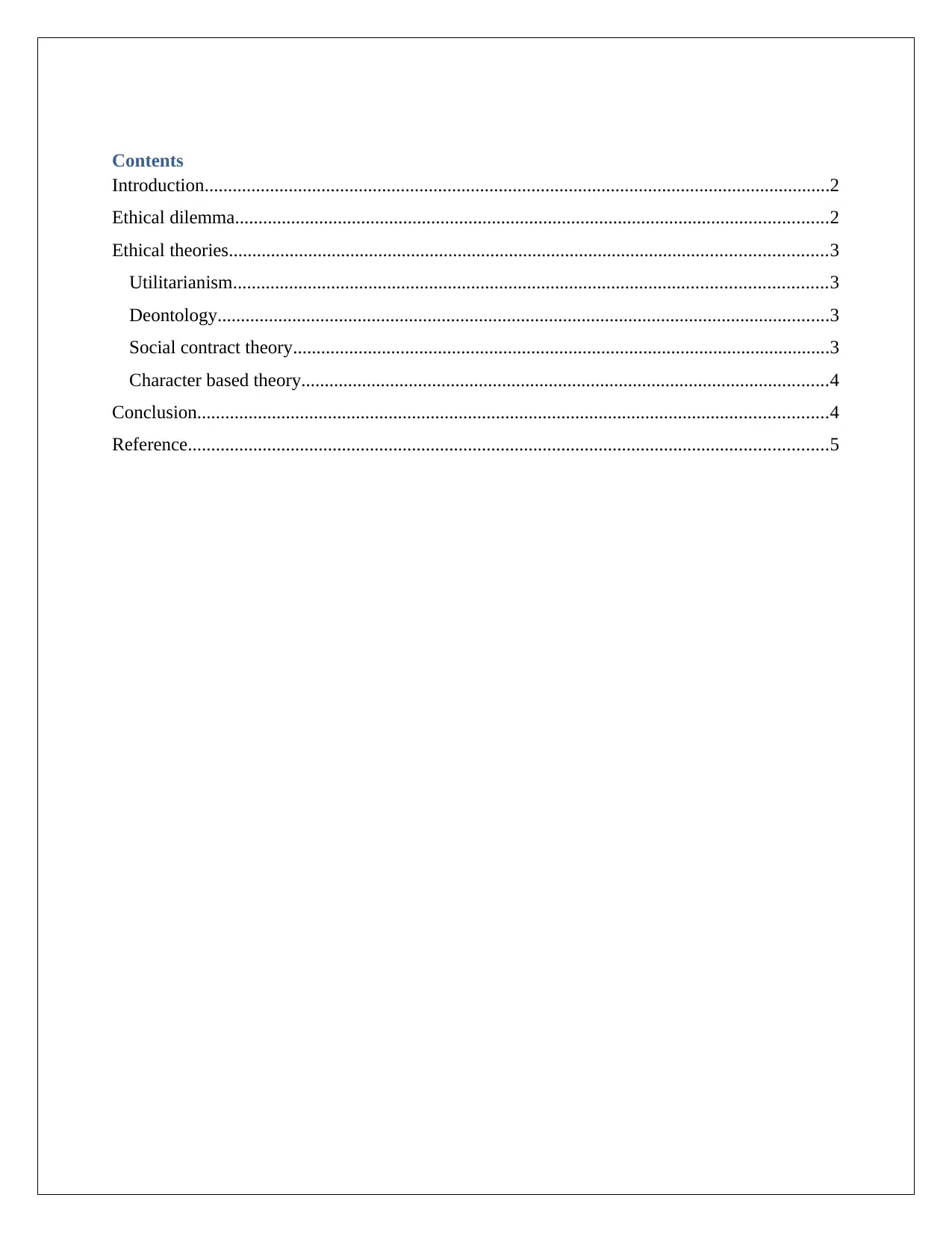
Contents
Introduction......................................................................................................................................2
Ethical dilemma...............................................................................................................................2
Ethical theories................................................................................................................................3
Utilitarianism...............................................................................................................................3
Deontology...................................................................................................................................3
Social contract theory...................................................................................................................3
Character based theory.................................................................................................................4
Conclusion.......................................................................................................................................4
Reference.........................................................................................................................................5
Introduction......................................................................................................................................2
Ethical dilemma...............................................................................................................................2
Ethical theories................................................................................................................................3
Utilitarianism...............................................................................................................................3
Deontology...................................................................................................................................3
Social contract theory...................................................................................................................3
Character based theory.................................................................................................................4
Conclusion.......................................................................................................................................4
Reference.........................................................................................................................................5
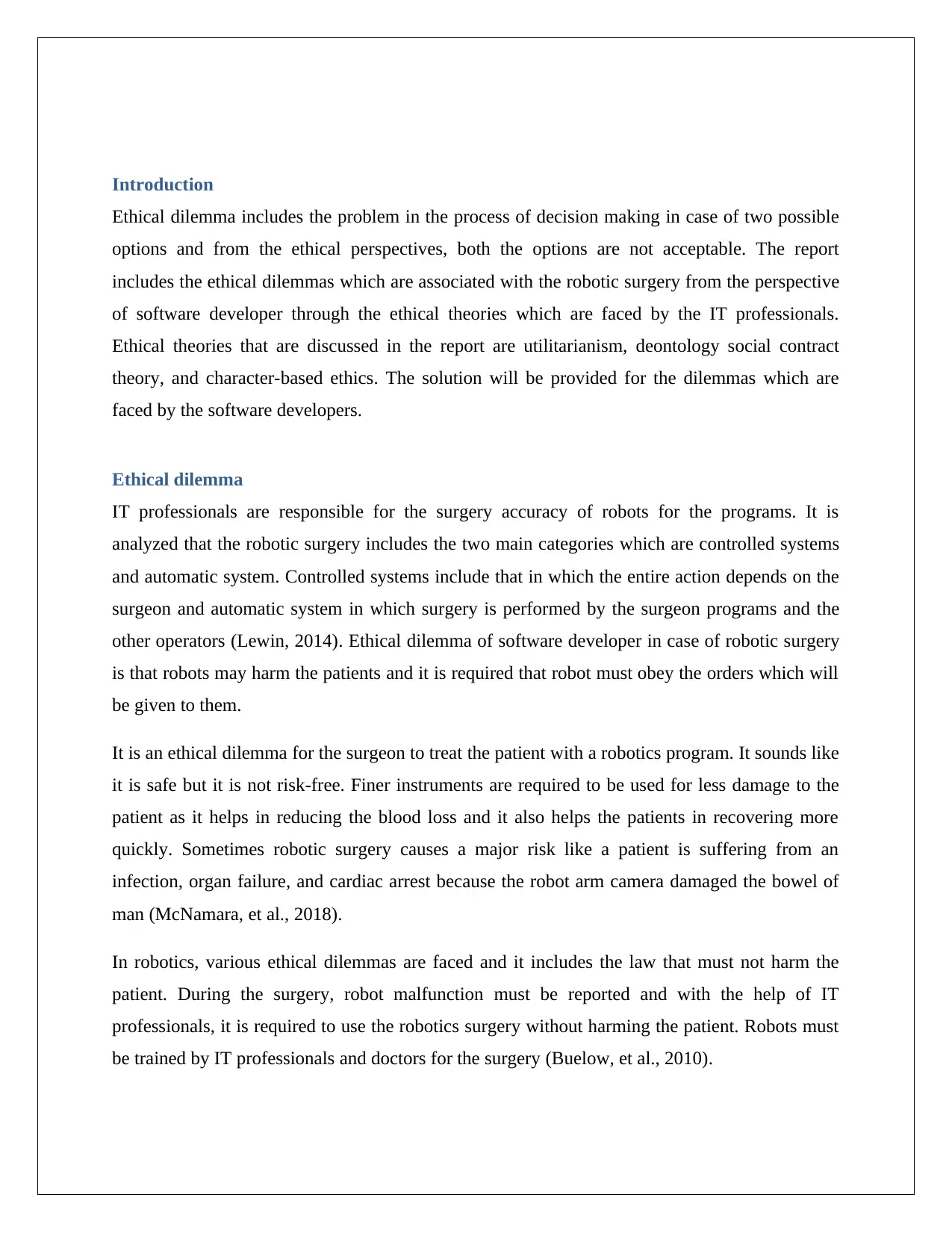
Introduction
Ethical dilemma includes the problem in the process of decision making in case of two possible
options and from the ethical perspectives, both the options are not acceptable. The report
includes the ethical dilemmas which are associated with the robotic surgery from the perspective
of software developer through the ethical theories which are faced by the IT professionals.
Ethical theories that are discussed in the report are utilitarianism, deontology social contract
theory, and character-based ethics. The solution will be provided for the dilemmas which are
faced by the software developers.
Ethical dilemma
IT professionals are responsible for the surgery accuracy of robots for the programs. It is
analyzed that the robotic surgery includes the two main categories which are controlled systems
and automatic system. Controlled systems include that in which the entire action depends on the
surgeon and automatic system in which surgery is performed by the surgeon programs and the
other operators (Lewin, 2014). Ethical dilemma of software developer in case of robotic surgery
is that robots may harm the patients and it is required that robot must obey the orders which will
be given to them.
It is an ethical dilemma for the surgeon to treat the patient with a robotics program. It sounds like
it is safe but it is not risk-free. Finer instruments are required to be used for less damage to the
patient as it helps in reducing the blood loss and it also helps the patients in recovering more
quickly. Sometimes robotic surgery causes a major risk like a patient is suffering from an
infection, organ failure, and cardiac arrest because the robot arm camera damaged the bowel of
man (McNamara, et al., 2018).
In robotics, various ethical dilemmas are faced and it includes the law that must not harm the
patient. During the surgery, robot malfunction must be reported and with the help of IT
professionals, it is required to use the robotics surgery without harming the patient. Robots must
be trained by IT professionals and doctors for the surgery (Buelow, et al., 2010).
Ethical dilemma includes the problem in the process of decision making in case of two possible
options and from the ethical perspectives, both the options are not acceptable. The report
includes the ethical dilemmas which are associated with the robotic surgery from the perspective
of software developer through the ethical theories which are faced by the IT professionals.
Ethical theories that are discussed in the report are utilitarianism, deontology social contract
theory, and character-based ethics. The solution will be provided for the dilemmas which are
faced by the software developers.
Ethical dilemma
IT professionals are responsible for the surgery accuracy of robots for the programs. It is
analyzed that the robotic surgery includes the two main categories which are controlled systems
and automatic system. Controlled systems include that in which the entire action depends on the
surgeon and automatic system in which surgery is performed by the surgeon programs and the
other operators (Lewin, 2014). Ethical dilemma of software developer in case of robotic surgery
is that robots may harm the patients and it is required that robot must obey the orders which will
be given to them.
It is an ethical dilemma for the surgeon to treat the patient with a robotics program. It sounds like
it is safe but it is not risk-free. Finer instruments are required to be used for less damage to the
patient as it helps in reducing the blood loss and it also helps the patients in recovering more
quickly. Sometimes robotic surgery causes a major risk like a patient is suffering from an
infection, organ failure, and cardiac arrest because the robot arm camera damaged the bowel of
man (McNamara, et al., 2018).
In robotics, various ethical dilemmas are faced and it includes the law that must not harm the
patient. During the surgery, robot malfunction must be reported and with the help of IT
professionals, it is required to use the robotics surgery without harming the patient. Robots must
be trained by IT professionals and doctors for the surgery (Buelow, et al., 2010).
⊘ This is a preview!⊘
Do you want full access?
Subscribe today to unlock all pages.

Trusted by 1+ million students worldwide
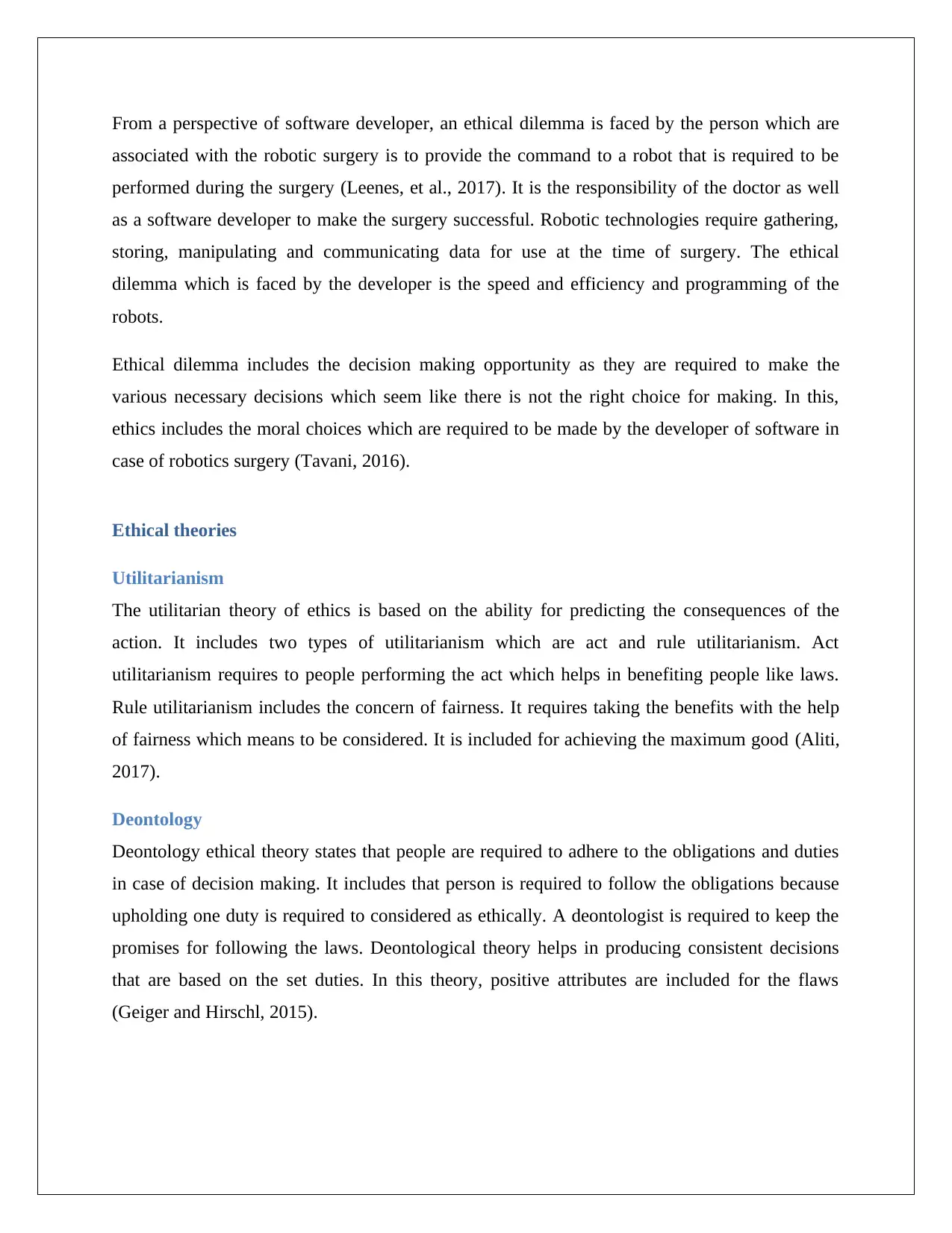
From a perspective of software developer, an ethical dilemma is faced by the person which are
associated with the robotic surgery is to provide the command to a robot that is required to be
performed during the surgery (Leenes, et al., 2017). It is the responsibility of the doctor as well
as a software developer to make the surgery successful. Robotic technologies require gathering,
storing, manipulating and communicating data for use at the time of surgery. The ethical
dilemma which is faced by the developer is the speed and efficiency and programming of the
robots.
Ethical dilemma includes the decision making opportunity as they are required to make the
various necessary decisions which seem like there is not the right choice for making. In this,
ethics includes the moral choices which are required to be made by the developer of software in
case of robotics surgery (Tavani, 2016).
Ethical theories
Utilitarianism
The utilitarian theory of ethics is based on the ability for predicting the consequences of the
action. It includes two types of utilitarianism which are act and rule utilitarianism. Act
utilitarianism requires to people performing the act which helps in benefiting people like laws.
Rule utilitarianism includes the concern of fairness. It requires taking the benefits with the help
of fairness which means to be considered. It is included for achieving the maximum good (Aliti,
2017).
Deontology
Deontology ethical theory states that people are required to adhere to the obligations and duties
in case of decision making. It includes that person is required to follow the obligations because
upholding one duty is required to considered as ethically. A deontologist is required to keep the
promises for following the laws. Deontological theory helps in producing consistent decisions
that are based on the set duties. In this theory, positive attributes are included for the flaws
(Geiger and Hirschl, 2015).
associated with the robotic surgery is to provide the command to a robot that is required to be
performed during the surgery (Leenes, et al., 2017). It is the responsibility of the doctor as well
as a software developer to make the surgery successful. Robotic technologies require gathering,
storing, manipulating and communicating data for use at the time of surgery. The ethical
dilemma which is faced by the developer is the speed and efficiency and programming of the
robots.
Ethical dilemma includes the decision making opportunity as they are required to make the
various necessary decisions which seem like there is not the right choice for making. In this,
ethics includes the moral choices which are required to be made by the developer of software in
case of robotics surgery (Tavani, 2016).
Ethical theories
Utilitarianism
The utilitarian theory of ethics is based on the ability for predicting the consequences of the
action. It includes two types of utilitarianism which are act and rule utilitarianism. Act
utilitarianism requires to people performing the act which helps in benefiting people like laws.
Rule utilitarianism includes the concern of fairness. It requires taking the benefits with the help
of fairness which means to be considered. It is included for achieving the maximum good (Aliti,
2017).
Deontology
Deontology ethical theory states that people are required to adhere to the obligations and duties
in case of decision making. It includes that person is required to follow the obligations because
upholding one duty is required to considered as ethically. A deontologist is required to keep the
promises for following the laws. Deontological theory helps in producing consistent decisions
that are based on the set duties. In this theory, positive attributes are included for the flaws
(Geiger and Hirschl, 2015).
Paraphrase This Document
Need a fresh take? Get an instant paraphrase of this document with our AI Paraphraser
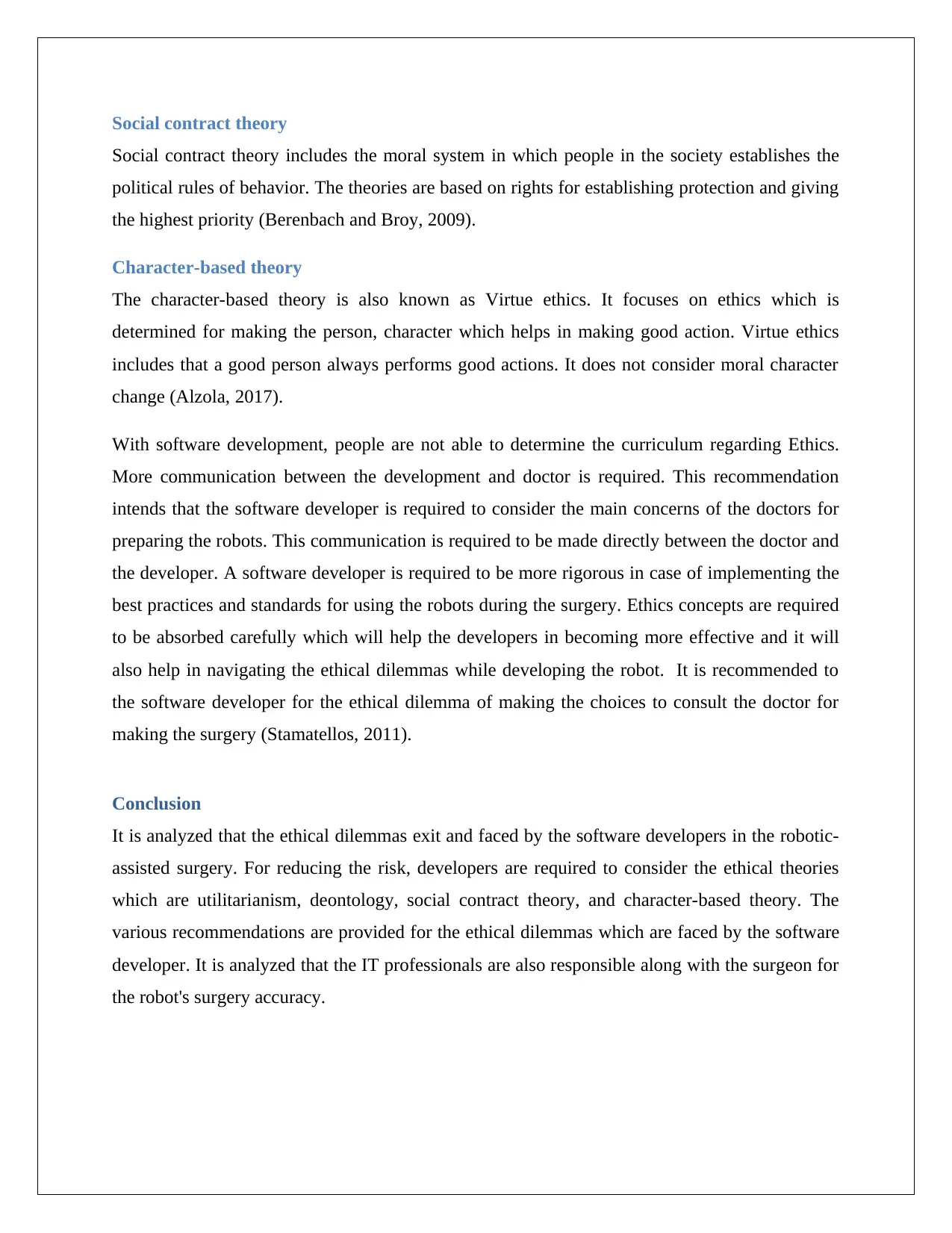
Social contract theory
Social contract theory includes the moral system in which people in the society establishes the
political rules of behavior. The theories are based on rights for establishing protection and giving
the highest priority (Berenbach and Broy, 2009).
Character-based theory
The character-based theory is also known as Virtue ethics. It focuses on ethics which is
determined for making the person, character which helps in making good action. Virtue ethics
includes that a good person always performs good actions. It does not consider moral character
change (Alzola, 2017).
With software development, people are not able to determine the curriculum regarding Ethics.
More communication between the development and doctor is required. This recommendation
intends that the software developer is required to consider the main concerns of the doctors for
preparing the robots. This communication is required to be made directly between the doctor and
the developer. A software developer is required to be more rigorous in case of implementing the
best practices and standards for using the robots during the surgery. Ethics concepts are required
to be absorbed carefully which will help the developers in becoming more effective and it will
also help in navigating the ethical dilemmas while developing the robot. It is recommended to
the software developer for the ethical dilemma of making the choices to consult the doctor for
making the surgery (Stamatellos, 2011).
Conclusion
It is analyzed that the ethical dilemmas exit and faced by the software developers in the robotic-
assisted surgery. For reducing the risk, developers are required to consider the ethical theories
which are utilitarianism, deontology, social contract theory, and character-based theory. The
various recommendations are provided for the ethical dilemmas which are faced by the software
developer. It is analyzed that the IT professionals are also responsible along with the surgeon for
the robot's surgery accuracy.
Social contract theory includes the moral system in which people in the society establishes the
political rules of behavior. The theories are based on rights for establishing protection and giving
the highest priority (Berenbach and Broy, 2009).
Character-based theory
The character-based theory is also known as Virtue ethics. It focuses on ethics which is
determined for making the person, character which helps in making good action. Virtue ethics
includes that a good person always performs good actions. It does not consider moral character
change (Alzola, 2017).
With software development, people are not able to determine the curriculum regarding Ethics.
More communication between the development and doctor is required. This recommendation
intends that the software developer is required to consider the main concerns of the doctors for
preparing the robots. This communication is required to be made directly between the doctor and
the developer. A software developer is required to be more rigorous in case of implementing the
best practices and standards for using the robots during the surgery. Ethics concepts are required
to be absorbed carefully which will help the developers in becoming more effective and it will
also help in navigating the ethical dilemmas while developing the robot. It is recommended to
the software developer for the ethical dilemma of making the choices to consult the doctor for
making the surgery (Stamatellos, 2011).
Conclusion
It is analyzed that the ethical dilemmas exit and faced by the software developers in the robotic-
assisted surgery. For reducing the risk, developers are required to consider the ethical theories
which are utilitarianism, deontology, social contract theory, and character-based theory. The
various recommendations are provided for the ethical dilemmas which are faced by the software
developer. It is analyzed that the IT professionals are also responsible along with the surgeon for
the robot's surgery accuracy.
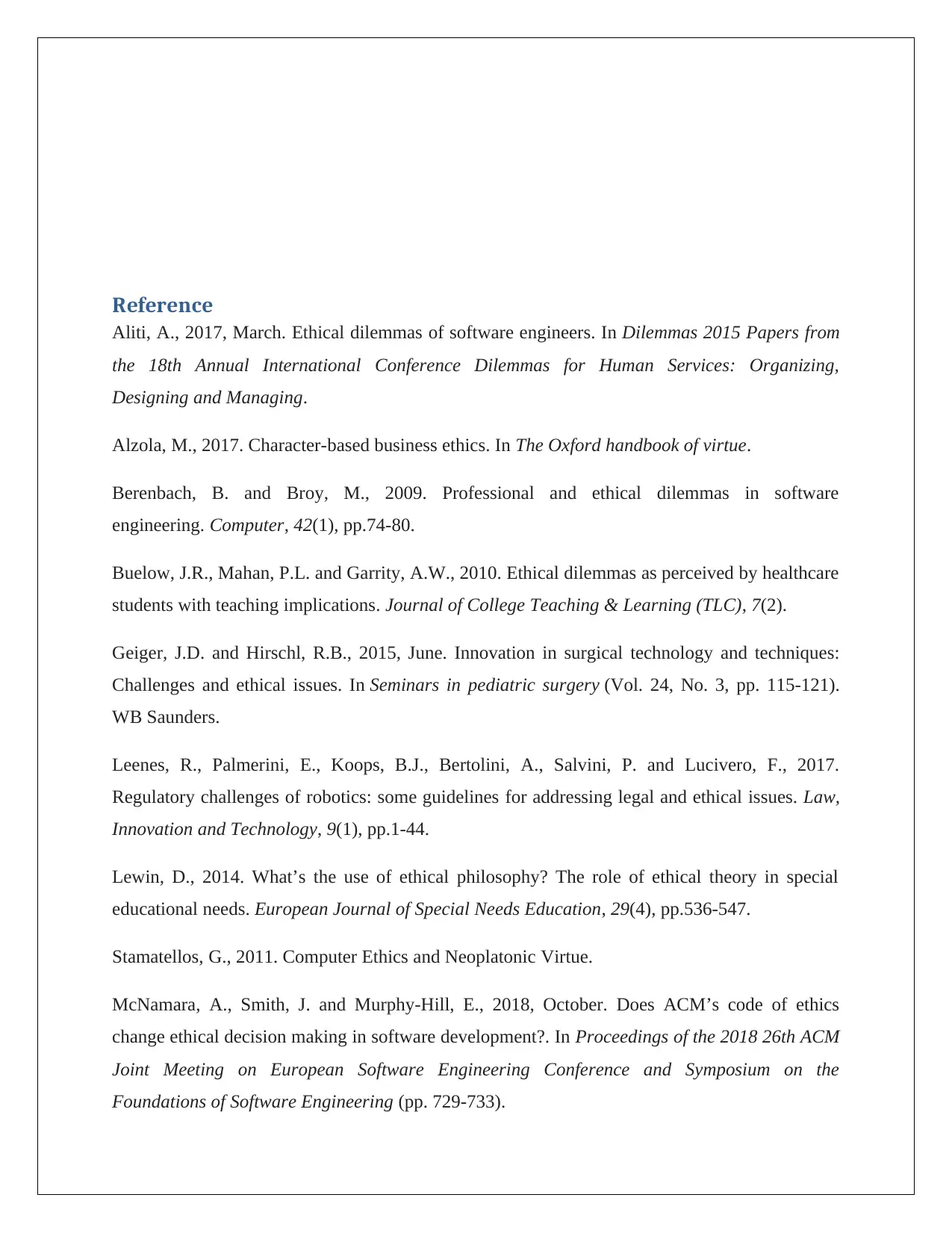
Reference
Aliti, A., 2017, March. Ethical dilemmas of software engineers. In Dilemmas 2015 Papers from
the 18th Annual International Conference Dilemmas for Human Services: Organizing,
Designing and Managing.
Alzola, M., 2017. Character-based business ethics. In The Oxford handbook of virtue.
Berenbach, B. and Broy, M., 2009. Professional and ethical dilemmas in software
engineering. Computer, 42(1), pp.74-80.
Buelow, J.R., Mahan, P.L. and Garrity, A.W., 2010. Ethical dilemmas as perceived by healthcare
students with teaching implications. Journal of College Teaching & Learning (TLC), 7(2).
Geiger, J.D. and Hirschl, R.B., 2015, June. Innovation in surgical technology and techniques:
Challenges and ethical issues. In Seminars in pediatric surgery (Vol. 24, No. 3, pp. 115-121).
WB Saunders.
Leenes, R., Palmerini, E., Koops, B.J., Bertolini, A., Salvini, P. and Lucivero, F., 2017.
Regulatory challenges of robotics: some guidelines for addressing legal and ethical issues. Law,
Innovation and Technology, 9(1), pp.1-44.
Lewin, D., 2014. What’s the use of ethical philosophy? The role of ethical theory in special
educational needs. European Journal of Special Needs Education, 29(4), pp.536-547.
Stamatellos, G., 2011. Computer Ethics and Neoplatonic Virtue.
McNamara, A., Smith, J. and Murphy-Hill, E., 2018, October. Does ACM’s code of ethics
change ethical decision making in software development?. In Proceedings of the 2018 26th ACM
Joint Meeting on European Software Engineering Conference and Symposium on the
Foundations of Software Engineering (pp. 729-733).
Aliti, A., 2017, March. Ethical dilemmas of software engineers. In Dilemmas 2015 Papers from
the 18th Annual International Conference Dilemmas for Human Services: Organizing,
Designing and Managing.
Alzola, M., 2017. Character-based business ethics. In The Oxford handbook of virtue.
Berenbach, B. and Broy, M., 2009. Professional and ethical dilemmas in software
engineering. Computer, 42(1), pp.74-80.
Buelow, J.R., Mahan, P.L. and Garrity, A.W., 2010. Ethical dilemmas as perceived by healthcare
students with teaching implications. Journal of College Teaching & Learning (TLC), 7(2).
Geiger, J.D. and Hirschl, R.B., 2015, June. Innovation in surgical technology and techniques:
Challenges and ethical issues. In Seminars in pediatric surgery (Vol. 24, No. 3, pp. 115-121).
WB Saunders.
Leenes, R., Palmerini, E., Koops, B.J., Bertolini, A., Salvini, P. and Lucivero, F., 2017.
Regulatory challenges of robotics: some guidelines for addressing legal and ethical issues. Law,
Innovation and Technology, 9(1), pp.1-44.
Lewin, D., 2014. What’s the use of ethical philosophy? The role of ethical theory in special
educational needs. European Journal of Special Needs Education, 29(4), pp.536-547.
Stamatellos, G., 2011. Computer Ethics and Neoplatonic Virtue.
McNamara, A., Smith, J. and Murphy-Hill, E., 2018, October. Does ACM’s code of ethics
change ethical decision making in software development?. In Proceedings of the 2018 26th ACM
Joint Meeting on European Software Engineering Conference and Symposium on the
Foundations of Software Engineering (pp. 729-733).
⊘ This is a preview!⊘
Do you want full access?
Subscribe today to unlock all pages.

Trusted by 1+ million students worldwide
1 out of 6
Related Documents
Your All-in-One AI-Powered Toolkit for Academic Success.
+13062052269
info@desklib.com
Available 24*7 on WhatsApp / Email
![[object Object]](/_next/static/media/star-bottom.7253800d.svg)
Unlock your academic potential
Copyright © 2020–2026 A2Z Services. All Rights Reserved. Developed and managed by ZUCOL.





